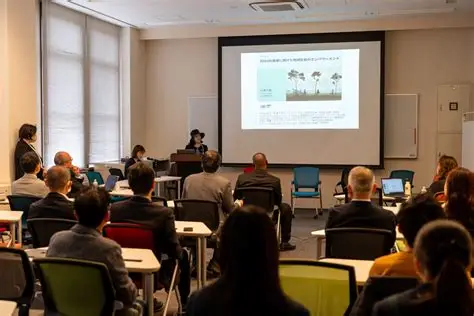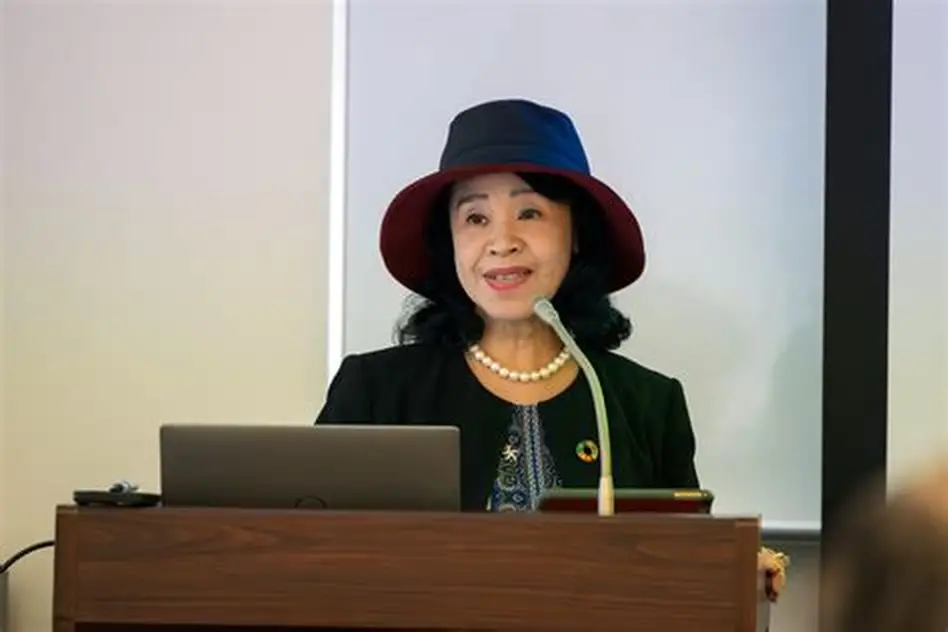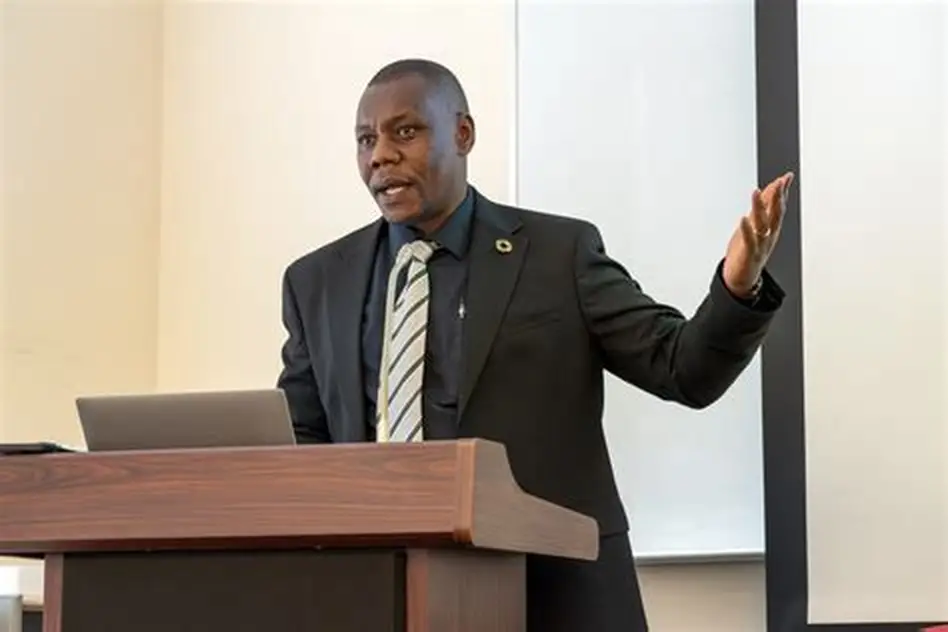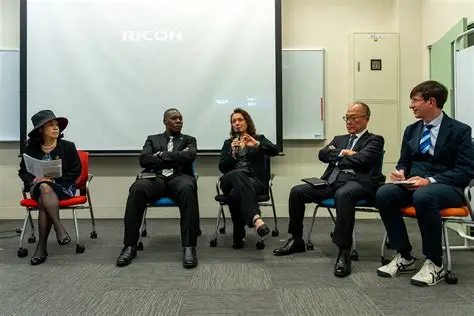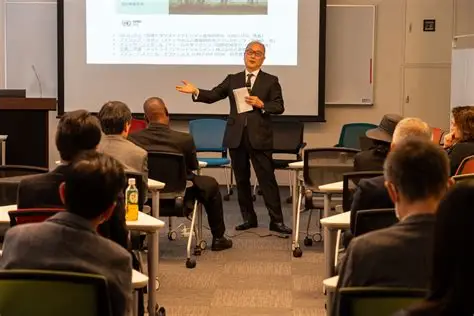Local initiatives are said to have great potential in promoting the fundamental changes needed around the world to achieve the Sustainable Development Goals (SDGs). Local initiatives also play an important role in bringing people involved in different sectors together to work toward the goals.
The seminar was welcomed three esteemed trustees from the United Nations University Institute of Advanced Studies for Sustainability as guest speakers. Dr. Juan, Research Associate at the United Nations University also presented on the successes achieved by various regional initiatives, showcasing how they have empowered local communities to increase their knowledge and action.
Welcome Address by Prof. Shinobu Yamaguchi, Director of the United Nations University’s Advanced Institute for Sustainability, on behalf of the Hosting Committee
Director Yamaguchi highlighted two key points. First, he referenced the “Sustainable Development Report 2023” released by the United Nations and Secretary-General António Guterres’ remarks at the “SDG Summit” in New York, regarding the current rate of progress towards achieving the Sustainable Development Goals by 2030. He emphasized that the current rate of progress is low.
She stressed that this seminar was timely, as he discussed local efforts around the world, stating that the only way to implement the SDGs actions is “localizing” them
In her second point, Director Yamaguchi emphasized the importance of engaging young people and having them fostering deeper relationships with the issues. She cited Secretary-General Guterres’ comment that “only then can we promote actions around the world.”
Philip Osoni, Philip Osoni, Director for the Stockholm Environment Institute (SEI) Africa Center, discusses a program empowering the Maasai people of Kenya to build sustainable livelihoods through tourism
Africa is renowned for its rich biodiversity, boasting many species, particularly large mammals. Many of these species are only found in Africa, and although national parks have been established to safeguard them, these protected areas are not large enough, and the number of wild animals is becoming a phenomenon as they move out of these parks and cross paths with people. This issue is directly linked to SDG Goal #15, which prioritize wildlife conservation
On the other hand, many Maasai communities living in close proximity to wildlife often face significant economic challenges, including poverty, which is a major obstacle to achieving Goal #1 of the SDGs, (eradicating poverty)
Lions outside the national park occasionally attack livestock and people, which is why the Maasai people are building fences. We are financing the Maasai people to run a program to prevent them from building these fences so that the animals can move freely. We are also conducting a household survey to assess the impact of this program on both households that are benefiting from it and those that are not. The goal of this study is to understand how this initiative is affecting their livelihoods
It has become clear that the presence of wildlife in this area is crucial for the local residents, as it generates income through tourism, which helps alleviate poverty. This program is related to the Goal#1 of the Sustainable Development Goals (SDGs), and since its inception, it has contributed to enhancing the equality among the related people, which also aligns with the Goal#10.
─ This is a summary of the lecture
Melissa Goddard, Associate Director of the McMillan Center for International and Area Studies at Yale University, discusses the Vital Role of Universities in achieving the Sustainable Development Goals (SDGs)
The SDGs are a platform that can be used globally, which is really great, but the challenge is how to share and get things done in different cultures, different ways of thinking, and different roles we play.
To work together towards a common goal, a university’s presence is crucial. Here are six reasons why:
(1) Universities focus their activities on knowledge
(2) They produce and hold a number of leaders from diverse perspectives
(3) Dialogue is a core aspect of their work, enabling them to approach problem-solving through discussion
(4) They demonstrate and prove what can be achieved on-campus and at an urban space
(5) As an organization, they can provide support to communities through specialized expertise, such as healthcare and school education
(6) They play a crucial role in producing leaders for the next generation.
In our efforts to localize the Sustainable Development Goals (SDGs) through universities, the project we launched at Yale has set forth three key objectives. Firstly, we aim to harness the SDGs as a catalyst for interdisciplinary collaboration among individuals from diverse academic backgrounds. Secondly, we aim to illuminate the relevance of our research endeavors to global priority issues. Lastly, we seek to elevate awareness of the vital role universities play in driving progress towards a more sustainable future.
A recent student survey at Yale University found that research by professors focused on the Sustainable Development Goals (SDGs) is concentrated in areas such as health, peace, and education. Similarly, a subsequent survey conducted by the University of Pennsylvania using AI technology yielded comparable results. The use of AI enabled other universities to conduct their own surveys and create a large database. By linking the research findings to the SDGs in this survey, we were able to identify gaps in progress (divergence/low progress) across various goals.
The Summit of the Future in 2024 is scheduled to take place in September. During this event, discussions will focus on what needs to be done to achieve the goals, and what comes next after they are achieved. Through sharing knowledge and engaging in discussions, I believe that UN University as well as other universities, will play a significant role in shaping the future and making a positive impact.
─ This is a summary of the lecture.
Mr. Mitsuo Koizumi, Representative Director of MetLife Asset Management Co., Ltd., discusses Sustainability and Business
The Japanese government has finally decided to issue Green Transition Bonds (GX Transition Bonds) in the form of government bonds, which has attracted a lot of attention in the business community. The concept of Green Bonds, which requires funds to be spent towards projects that are good for the environment, has a relatively short history, dating back to the beginning of 2008. Initially, environmental issues were the primary focus, but the term Environmental, Social and Governance (ESG) emerged in 2015. Interestingly, 2015 was also the year of COP21 (Paris Agreement).
Since then, sustainable finance has become increasingly diverse, and even companies with no financial concerns can now issue green bonds, knowing they’ll be widely recognized and accepted. As a result, the trend has taken off rapidly.
The term ‘transition’ means switching over one state to another. For instance, consider a coal mining town. In our era, we’re witnessing a shift away from coal towards alternative energy sources like offshore wind and geothermal power. However, this transition must also consider the people, schools, and culture that exist within these communities. This aligns with the United Nations’ Sustainable Development Goals (SDGs) philosophy of leaving no one behind.
Additionally, I believe that this concept of transition resonates with Japan’s traditional values of community-centered thinking, where the well-being of the local community is paramount.
─── This is a summary of the lecture
Localizing the Sustainable Development Goals: Empowering Communities through Urban Ecology by Dr. Juan Pastor Ivars, UNU-IAS OUIK Research Associate
UNU OUIK created the Sustainable Urban Nature Project (SUN Project) in 2019 to promote Kanazawa’s rich urban nature to the world, while addressing issues such as climate change and biodiversity loss.
Kanazawa is the only city in Japan to be selected by the United Nations Environment Programme (UNEP) as a “Model City for Urban Ecosystem Restoration” because of the many strengths of its urban nature. 19 cities were selected from among 250 applicants to participate in the Intergenerational Environmental Restoration Project. Kanazawa was selected as one of 11 role model cities with an outstanding track record of implementing nature-based solutions. The project will run for three years, from 2023 to 2025.
Despite the high value of Kanazawa’s urban nature, the city is facing problems such as climate change, depopulation, and an aging population. The owners of traditional Japanese gardens, which play an important role in the biodiversity of urban nature, are aging, and many of these gardens are being destroyed every year due to lack of care. Seeing this situation, we decided to localize the SDGs and empower local communities.
Specifically, we localized on SDG Goal#13, Climate Change; SDGs#14 and #15, Biodiversity; SDG#3, Health and Wellbeing; and SDG#4, Quality Education.
We empowered local communities through urban nature by three phases: first “share and connect,” followed by “provide and evaluate,”and finally “plan and simulate.”
─ This is a summary of the lecture.
After the presentation, a Q&A session was held, with attendees actively engaging in discussions and sharing their thoughts.


